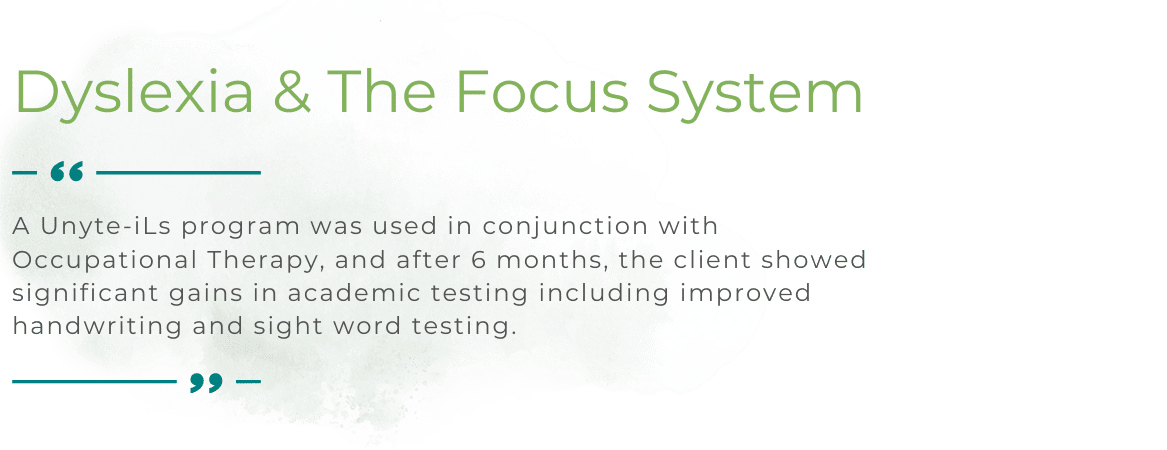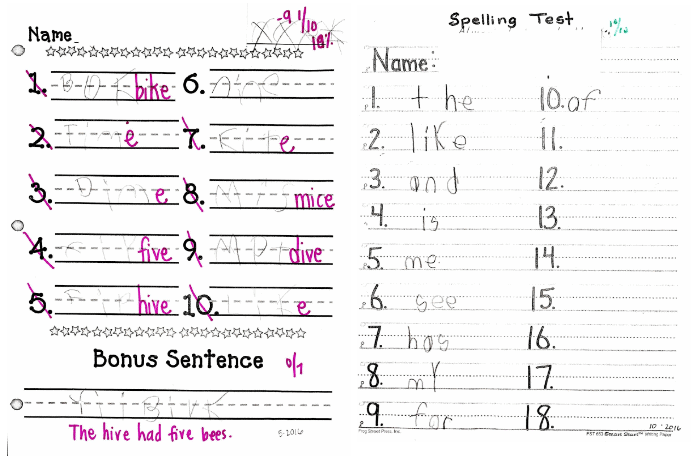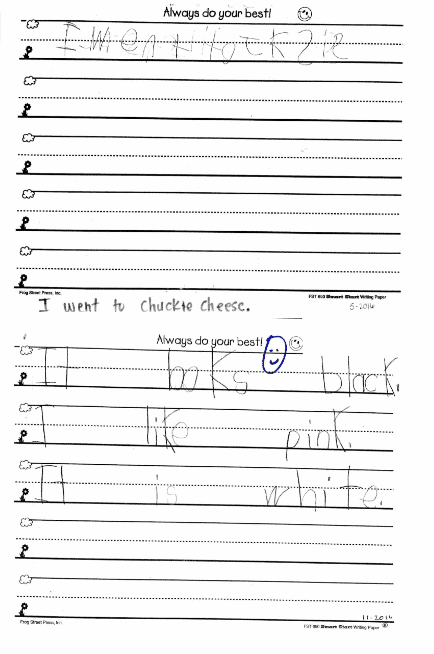Name of Organization: Brain Harmony
Clinicians: Christine Fazzino, COTA/L; Carol Garner-Houston, OTR/L
Clinician’s Discipline: Pediatric Occupational Therapy
Abstract:
Bryan, a kindergarten student struggled in school. His teacher summarized his performance for his first year of school by saying, “Despite multiple interventions, Bryan struggles with his letters and sounds. Due to this, he is behind in his sight word knowledge. This combined with his inability to decode words makes reading extremely difficult. Bryan also struggles to focus on the task at hand, he works below grade level, his writing is difficult to read and he seldom asks for help. Furthermore, he does not understand the taught material and he has difficulty listening and following instructions.” Bryan hated and avoided reading at all costs because of his difficulties. Only 40% of his writing was legible. As a result of his struggles, Bryan was held back in kindergarten.
Bryan’s parents brought him to their pediatrician who diagnosed him with dyslexia and referred him to Brain Harmony for an OT evaluation and treatment.
An initial Occupational Therapy evaluation was performed at Brain Harmony. Pre- and Post-testing measures were taken using informal and formal testing measures; client and parent interview, clinical observations, and the Beery-VMI.
A Unyte-iLs program was used in conjunction with Occupational Therapy, and after 6 months, the client showed significant gains in academic testing including improved handwriting and sight word testing. 99% of writing became legible compared to 40% pre-therapy and pre-Focus System. Bryan was referred to the doctor to reassess his dyslexia diagnosis.
Therapeutic Goals:
The goals of therapy were the following:
- To improve handwriting, including letter formation and line orientation;
- To improve Bryan’s attention and ability to follow directions; and
- To improve Bryan’s gross motor skills.
Unyte-iLs Program (program name, frequency, length, etc.):
Bryan completed sessions 1-14 of the Focus System: Sensory and Motor program at a frequency of one session per week for one hour over a period of 6 months during his Occupational Therapy sessions.
Pre-post assessments:
During the initial evaluation (June 2016), the Beery-Buktenica visual-motor integration (VMI) was completed. Bryan was re-evaluated in January 2017 at the age of 6 years, 10 months.
Beery – VMI
The Beery – (VMI) test is a neuropsychological test that analyzes visual construction skills. It identifies problems with visual perception, motor coordination, and visual-motor integration.
| Measure | Percentile | Raw | Scaled | Standard | Age Equivalency | Descriptive | ||||||
| June2016 | Jan2017 | June2016 | Jan2017 | June2016 | Jan2017 | June2016 | Jan2017 | June2016 | Jan2017 | June2016 | Jan2017 | |
| VMI | 27% | 53% | 15 | 19 | 8 | 10 | 91 | 101 | 5:6 | 7:1 | Low Average | Average |
| Visual Perception | 42% | 84% | 17 | 23 | 9 | 13 | 97 | 115 | 5:8 | 8:8 | Average | Above Average |
| Motor Coordination | 25% | 58% | 15 | 20 | 8 | 11 | 90 | 103 | 4:11 | 7:4 | Low Average | Average |
Work Product:
Writing samples from May 2016 to October 2016:
Writing samples from May 2016 to November 2016:
Therapist’s Comments:
In my 21 years of experience as a therapist, I have never seen this type of progress in such a short period of time. I have used the Focus System with hundreds of children and Bryan’s rapid neurological organization is the most dramatic I have seen. He came to us in the summer after being retained to repeat Kindergarten. His physician diagnosed him with dyslexia, and his parents were distraught without a plan on how to manage a “life long sentence”.
After 6 months of OT 1x per week and 14 sessions of the Focus System: Sensory Motor sessions, he no longer reverses his letters, his writing is beautiful with correct spelling, his memory is improved and most importantly he enjoys reading! He isn’t just meeting expectations this year; he is exceeding them beyond anything we could imagine.
Conclusions and Recommendations:
In January, 2017, Bryan was discharged from Occupational Therapy following his re-assessment which identified all of Bryan’s scores to be at or above his age equivalency. Bryan does not avoid reading and is excelling in school.
Overall, Bryan demonstrates significant positive changes in many areas. This client’s therapists and parents will agree that using the Focus System was a key factor in stimulating the progress in the areas of handwriting and overall motor function.
His parents were pleased with the progress that the Focus System in conjunction with Occupational Therapy has had on Bryan. They will begin to use the Focus System at home. Bryan’s parents were provided with exercises to do at home in order to aid in Bryan’s success and progress.







 © 2025 Unyte Health US Inc.
© 2025 Unyte Health US Inc.